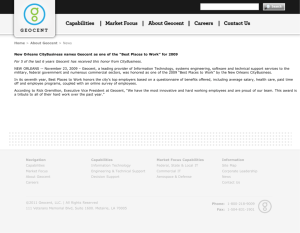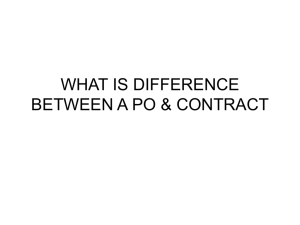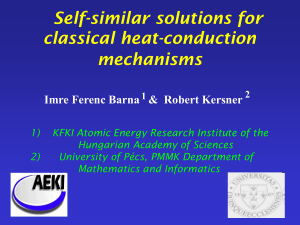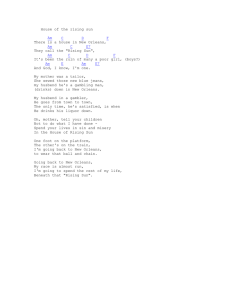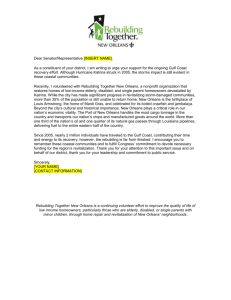Self-similar groups and hyperbolic groupoids II Volodymyr Nekrashevych June 22, 2012, Orleans
advertisement
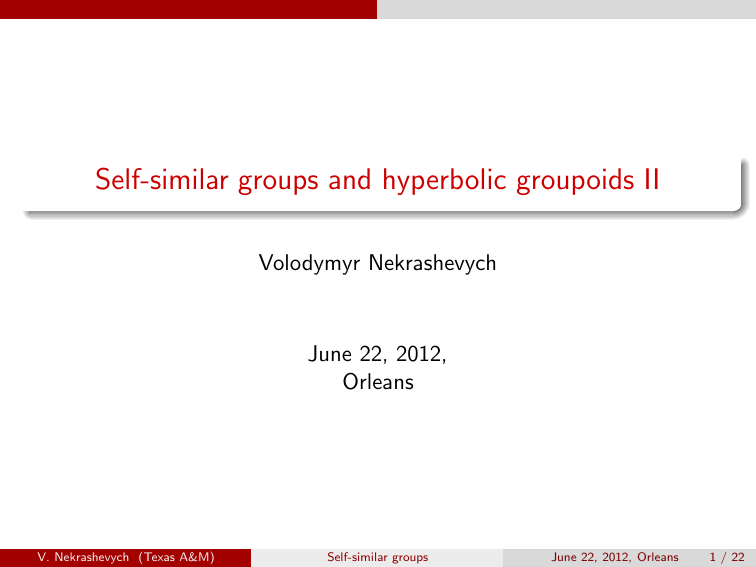
Self-similar groups and hyperbolic groupoids II
Volodymyr Nekrashevych
June 22, 2012,
Orleans
V. Nekrashevych (Texas A&M)
Self-similar groups
June 22, 2012, Orleans
1 / 22
Contracting groups
Contracting groups
Let (G , X) be a self-similar group. For every g ∈ G and v ∈ X∗ there
exists g |v ∈ G such that
g (vw ) = g (v )g |v (w )
for all w ∈ X∗ . We call g |v the section of g at v .
We say that (G , X) is contracting if there exists a finite subset N ⊂ G
such that for every g ∈ G there exists n ∈ N such that g |v ∈ N for all
v ∈ X∗ such that |v | ≥ n.
V. Nekrashevych (Texas A&M)
Self-similar groups
June 22, 2012, Orleans
2 / 22
Contracting groups
Proposition
If f : M1 −→ M is an expanding covering of a Riemannian manifold, then
its iterated monodromy group is contracting.
Section γ|x1 x2 ...xn is the loop
−1
−1
`−1
yn `yn yn−1 . . . `yn ...y1 γx1 ...xn `xn ...x1 . . . `xn xn−1 `xn ,
where `an ...ak is the lift of `an by f n−k starting at the end of `an−1 ...ak , and
γx1 ...xn is the lift of γ by f n starting at the end of `x1 ...xn . Since the length
of lifts of paths by f n exponentially decrease, we get a uniform bound on
the length of γv for all v big enough.
V. Nekrashevych (Texas A&M)
Self-similar groups
June 22, 2012, Orleans
3 / 22
Contracting groups
Some properties of contracting groups
Contracting groups have solvable word problem in polynomial time.
Contracting groups have no free subgroups (amenable?).
Many (all except for virtually nilpotent?) are not finitely presented.
V. Nekrashevych (Texas A&M)
Self-similar groups
June 22, 2012, Orleans
4 / 22
Contracting groups
Limit dynamical system
Let (G , X) be a contracting group. Consider the space X−ω = {. . . x2 x1 }
of left-infinite sequences over X. Two sequences . . . x2 x1 , . . . y2 y1 are
equivalent w.r.t. G if there exists a sequence gn ∈ G assuming a finite set
of values such that
gn (xn . . . x1 ) = yn . . . y1 .
The quotient of X−ω by this equivalence relation is the limit space JG of
(G , X). The equivalence relation is invariant under the shift
. . . x2 x1 7→ . . . x3 x2 .
Hence, the shift induces a continuous map s : JG −→ JG .
V. Nekrashevych (Texas A&M)
Self-similar groups
June 22, 2012, Orleans
5 / 22
Contracting groups
Another definition
Let Γ be the diagram of the automaton generating (G , X). Paths going
along the arrows describe the action of the generators. Let
R ⊂ X−ω × X−ω be the pairs of infinite words read along left-infinite paths
(paths going against the arrows). Then the equivalence relation generated
by R is the equivalence relation defining JG .
V. Nekrashevych (Texas A&M)
Self-similar groups
June 22, 2012, Orleans
6 / 22
Contracting groups
Adding machine action
We get identifications . . . 001xn . . . x1 ∼ . . . 110xn . . . x1 , and all their
shifts, hence JZ = R/Z.
V. Nekrashevych (Texas A&M)
Self-similar groups
June 22, 2012, Orleans
7 / 22
Contracting groups
Main theorem
Theorem
Suppose that f : M1 −→ M is expanding. Then G = IMG(f ) is
contracting and (JG , s) is topologically
conjugate to the action of f on the
S
set of accumulation points of n≥0 f −n (t).
Hence, the contructions of the iterated monodromy group and the limit
dynamical system are inverse to each other in hyperbolic cases (expanding
maps and contracting self-similar groups).
V. Nekrashevych (Texas A&M)
Self-similar groups
June 22, 2012, Orleans
8 / 22
Contracting groups
Hyperbolic graphs
A geodesic metric space (e.g., a graph) is δ-hyperbolic if every geodesic
triangle is δ-thin.
V. Nekrashevych (Texas A&M)
Self-similar groups
June 22, 2012, Orleans
9 / 22
Contracting groups
Hyperbolic boundary
V. Nekrashevych (Texas A&M)
Self-similar groups
June 22, 2012, Orleans
10 / 22
Contracting groups
Limit spaces as Gromov boundaries
Consider the graph Γ(G , X) with the set of vertices X∗ in which two
vertices are connected by an edge in two cases:
they are of the form v and xv ;
they are of the form v and s(v ), where s belongs to a fixed finite
generating set of G .
Theorem
If (G , X) is contracting, then Γ(G , X) is Gromov hyperbolic. Its boundary
is homeomorphic to JG . The shift s : JG −→ JG is induced by the map
vx 7→ v on Γ(G , X) \ {∅}.
V. Nekrashevych (Texas A&M)
Self-similar groups
June 22, 2012, Orleans
11 / 22
Contracting groups
The graph Γ(G , X) consists of the tree of edges (v , xv ) and of the union of
Schreier graphs describing the action of the generating set on the levels Xn .
V. Nekrashevych (Texas A&M)
Self-similar groups
June 22, 2012, Orleans
12 / 22
Contracting groups
V. Nekrashevych (Texas A&M)
Self-similar groups
June 22, 2012, Orleans
13 / 22
Contracting groups
V. Nekrashevych (Texas A&M)
Self-similar groups
June 22, 2012, Orleans
14 / 22
Contracting groups
Let f : M −→ M be a self-covering. Let γ be a path in M from t1 to t2 .
The lifts of F
γ by iterations of f define an isomorphism Hγ between the
−n (t ).
trees Tti = ∞
i
n=0 f
If f is expanding, then the length of lifts approaches 0, and hence
d(v , Hγ (v )) → 0 in M as v → ∞ in Tt1 .
V. Nekrashevych (Texas A&M)
Self-similar groups
June 22, 2012, Orleans
15 / 22
Contracting groups
If γ is a path in M between two vertices of Tt , then it defines an
isomorphism between the corresponding sub-trees of Tt :
These are transformations of the form v1 w 7→ v2 g (w ) for fixed v1 , v2 ∈ X∗
and g ∈ IMG(f ). They form an inverse semigroup generated by G and
the transformations Tx : w 7→ xw .
V. Nekrashevych (Texas A&M)
Self-similar groups
June 22, 2012, Orleans
16 / 22
Cuntz-Pimsner algebra
Cuntz-Pimsner algebras of self-similar groups
Let (G , X) be a self-similar group. Its Cuntz-Pimsner algebra OG is the
universal C ∗ generated by G (as unitaries) and isometries Sx for x ∈ X
satisfying
X
Sx∗ Sx = 1,
Sx Sx∗ = 1
x∈X
and
g · Sx = Sy · h
whenever g · x = y · h. The algebra generated by Sx , x ∈ X is the Cuntz
algebra O|X| .
V. Nekrashevych (Texas A&M)
Self-similar groups
June 22, 2012, Orleans
17 / 22
Cuntz-Pimsner algebra
Let H = L2 (Xω ) for the uniform Bernoulli measure on Xω . G acts by
measure-preserving transformations on Xω , and we get the associated
unitary representation of G on H. The transformations Tx : w 7→ xw
1
µ(A), hence the operator Sx given by
satisfy µ(Tx (A)) = |X|
p
|X|f (w ) if y = x
Sx (f )(yw ) =
0 othewise
is an isometry. It is easy to check that G and Sx satisfying the defining
relations of OG , hence they define a representation of OG .
V. Nekrashevych (Texas A&M)
Self-similar groups
June 22, 2012, Orleans
18 / 22
Cuntz-Pimsner algebra
A contracting group (G , X) is regular if for every g ∈ G and w ∈ Xω either
g (w ) 6= w , or g acts trivially on a neighborhood of w . Equivalently,
(G , X) is regular iff s : JG −→ JG is a covering map. For example,
IMG(f ) is regular if f is a hyperbolic rational function.
V. Nekrashevych (Texas A&M)
Self-similar groups
June 22, 2012, Orleans
19 / 22
Cuntz-Pimsner algebra
Theorem
If (G , X) is a regular contracting group, then OG is defined by a finite set
of relations, simple, purely infinite, nuclear, and satisfies the UCT.
In particular, OG is a Kirchberg algebra, and is classifiable by its K-theory.
If f (z) = z 2 + c is a hyperbolic quadratic polynomial, then OIMG(f ) is
generated by the Cuntz algebra O2 = hS0 , S1 i and a unitary a satisfying
a = S1 S0∗ + S0 (1 − Sv Sv∗ + Sv aSv∗ )S1∗ .
for a product Sv = Sx1 Sx2 · · · Sxn , where x1 x2 . . . xn is related to the
kneading sequence of the polynomial.
V. Nekrashevych (Texas A&M)
Self-similar groups
June 22, 2012, Orleans
20 / 22
Cuntz-Pimsner algebra
K -theory of hyperbolic rational functions
Theorem
Let G = IMG(f ), where f is a hyperbolic rational function. Then
K0 (OIMG(f ) ) ∼
= Z/(d − 1)Z ⊕ Zc−1 ,
K1 (OIMG(f ) ) ∼
= Z/l Z ⊕ Zc−1 ,
where d = deg f , c is the number of attracting cycles, l is the g.c.d. of
their lengths.
In particular, all algebras OIMG(f ) are pairwise isomorphic for all hyperbolic
quadratic polynomials f (z) = z 2 + c. The Cuntz-Pimsner algebras of the
bimodules over C0 (Jf ) have the same K-theory.
V. Nekrashevych (Texas A&M)
Self-similar groups
June 22, 2012, Orleans
21 / 22
Cuntz-Pimsner algebra
The Cuntz-Pimsner algebra OG have a natural action of the circle:
Γz (Sx ) = zSx ,
Γz (g ) = g .
Theorem
Let (Gi , X) be regular contracting groups. The dynamical systems
(OGi , Γz ), i = 1, 2, are isomorphic iff the limit dynamical systems (JGi , s)
are topologically conjugate.
V. Nekrashevych (Texas A&M)
Self-similar groups
June 22, 2012, Orleans
22 / 22

